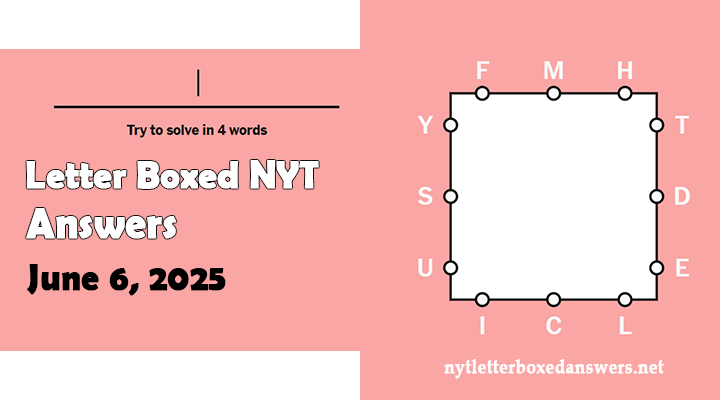NYT Letter Boxed quiz for Friday June 6, 2025 is released. We came up with Letter Boxed June 6 2025 Answers and Hints for you. With the help of these hints, you will be able to guess the words of letter boxed quiz without revealing the answers and get the solution.
| Top | Right | Bottom | Left |
|---|---|---|---|
| FMH | TDE | ICL | YSU |
| Two Words Solution | ||
|---|---|---|
| CHEFS | SEMIFLUIDITY | |
| CHEMISM | MULTIFIDLY | |
| MISCHIEF | FLUIDITY | |
| MUDFISHES | SELECTLY | |
| Three Words Solution | ||
|---|---|---|
| CELTS | SELFISH | HUMIDLY |
| CELTS | SHISH | HUMIDIFY |

Word 01:
This 5-letter word starts with C and ends with S; refers to skilled professionals who prepare and cook food.
Found in restaurants, hotels, and private kitchens.
May specialize in pastries, sauces, or specific cuisines.
Wear tall white hats and double-breasted jackets.
Often create menus and supervise kitchen staff.
Trained in culinary schools or through apprenticeships.
Can earn titles like sous or executive.
Known for knife skills and creativity.
Featured in shows like Top Chef and MasterChef.
Essential in the hospitality and catering industries.
Word 02:
This 12-letter word starts with S and ends with Y; it describes a state between solid and liquid.
Often used in science or material studies.
Common in substances like gels or thick pastes.
Describes something that flows, but slowly.
May occur due to temperature or composition.
Found in lava, mud, and some polymers.
Opposite of rigid or entirely fluid.
Crucial in product textures (e.g., cosmetics).
Combines properties of both fluidity and solidity.
Indicates a transitional or intermediate physical state.
Word 01:
This 7-letter word starts with C and ends with M; it refers to chemical activity or interaction.
Archaic or technical term in chemistry.
Implies energy or force behind reactions.
May describe attraction or repulsion of elements.
Rooted in theories of classical chemistry.
Can relate to biological or physiological processes.
Involves transformation at a molecular level.
Associated with reaction kinetics and bonding.
Used poetically to suggest chemistry between people.
Shares a root with “alchemy” and “chemistry.”
Word 02:
This 10-letter word starts with M and ends with Y; it means in a manner that is split or divided into many parts.
Derived from botanical or anatomical contexts.
Describes branching or segmented patterns.
Suggests multiple divisions or lobes.
Rare in general usage; mostly technical.
Appears in descriptions of roots, leaves, or nerves.
Built from Latin roots multi (many) + fid (split).
May refer to morphological complexity.
Adverb form of “multifid.”
Useful in taxonomic classification.
Word 01:
This 8-letter word starts with M and ends with F; refers to playful misbehavior or troublemaking.
Commonly used to describe pranks by children.
Often harmless but annoying.
Synonym of naughtiness or roguishness.
Can lead to unintended consequences.
Describes classic traits of fairies or imps.
Found in phrases like “a bit of mischief.”
Associated with laughter, surprise, and disobedience.
Not always malicious—can be affectionate.
Rooted in Old French meschief, meaning misfortune.
Word 02:
This 8-letter word starts with F and ends with Y; it refers to the quality of flowing easily.
Applies to both literal and metaphorical contexts.
Describes water, speech, movement, or identity.
Indicates grace, adaptability, or smoothness.
Opposite of rigidity or fixity.
Found in physics, dance, and linguistics.
Can describe flexibility in ideas or roles.
Rooted in Latin fluidus — flowing.
A desirable trait in art and communication.
Associated with dynamism and continuous change.
Word 01:
This 9-letter word starts with M and ends with S; refers to fish adapted to live in muddy or swampy waters.
Known for surviving in low-oxygen environments.
Some species can breathe air or bury in mud.
Found in Africa, Asia, and the Americas.
May aestivate during dry seasons.
Includes species like lungfish and bowfin.
Hardy fish often studied in evolutionary biology.
Adapted to extreme or fluctuating conditions.
Sometimes kept in aquariums or used in research.
Indicators of wetland ecosystem health.
Word 02:
This 8-letter word starts with S and ends with Y; means in a selective or discriminating way.
Rare and archaic adverb form of “select.”
Implies careful choice or curation.
Used in formal or literary contexts.
May describe targeted preferences or actions.
Could refer to specific sampling methods.
Suggests intentional, non-random behavior.
Derived from Latin seligere, to choose.
Related to exclusivity or refinement.
Emphasizes distinction or judgment in choices.
Word 01:
This 5-letter word starts with C and ends with S; refers to ancient European people known for their tribal culture.
Originated in central Europe, spread to Britain and Ireland.
Known for their art, warfare, and language.
Spoke languages in the Celtic branch.
Left behind rich archaeological finds.
Celebrated in modern-day Ireland, Scotland, and Wales.
Had no centralized empire, but complex societies.
Practiced Druidism and polytheism.
Roman sources documented their customs and bravery.
Inspired modern Celtic identity and traditions.
Word 02:
This 7-letter word starts with S and ends with H; describes someone concerned only with their own advantage.
Often used negatively in social or moral contexts.
Opposite of generous or altruistic.
Associated with egocentricity or self-interest.
Commonly used in arguments about fairness.
Can describe behavior in relationships or teamwork.
Rooted in the word “self” and a suffix meaning “having the quality of.”
Appears in phrases like “selfish motives” or “don’t be selfish.”
May also apply to decision-making or resource sharing.
A personality trait often discouraged from childhood.
Word 03:
This 7-letter word starts with H and ends with Y; it means in a way that is damp, moist, or contains moisture.
Often describes tropical or summer climates.
Related to discomfort caused by sticky or wet air.
Adverb form of a term describing high moisture levels.
Found in weather reports and atmospheric science.
Affects sweat evaporation and human comfort.
May influence mold growth or rust formation.
Associated with greenhouse conditions.
Comes from Latin humidus, meaning moist.
Often paired with “warm,” “air,” or “breeze.”
Word 01:
This 5-letter word starts with C and ends with S; refers to ancient European people known for their tribal culture.
Originated in central Europe, spread to Britain and Ireland.
Known for their art, warfare, and language.
Spoke languages in the Celtic branch.
Left behind rich archaeological finds.
Celebrated in modern-day Ireland, Scotland, and Wales.
Had no centralized empire, but complex societies.
Practiced Druidism and polytheism.
Roman sources documented their customs and bravery.
Inspired modern Celtic identity and traditions.
Word 02:
This 5-letter word starts with S and ends with H; a word often used in food contexts, especially with “kebab.”
Refers to skewered and grilled meat, typically in Middle Eastern cuisine.
Can be found in “shish tawook” or “shish kofta.”
Borrowed from Turkish, meaning “skewer.”
Appears on menus with grilled vegetables.
Cooked over open flames or grills.
Popular in Mediterranean and Levantine diets.
Often served with pita, salad, or rice.
Street food staple in many countries.
Also used informally to quiet someone (“shush”).
Word 03:
This 8-letter word starts with H and ends with Y; means to add moisture or dampness to the air.
Used in households to combat dryness.
Common in winter when heating reduces air moisture.
Helps prevent dry skin, sore throats, or static electricity.
Can be done with a steam or ultrasonic device.
Important for indoor plants and comfort.
Opposite of “dehumidify.”
Used in climate control and medical environments.
Rooted in Latin humidus, meaning moist.
Often measured by a hygrometer for accuracy.

Chris Brown is a passionate word game love and problem solving expert. With over 15 years of experience in solving puzzle challenges, he provides daily NYT Letter Boxed answers, tips and strategies to help other players so that they can improve their solving skills. Whether you are stuck on a tricky puzzle or looking for new techniques, Chris is here to guide you with his expert solutions.